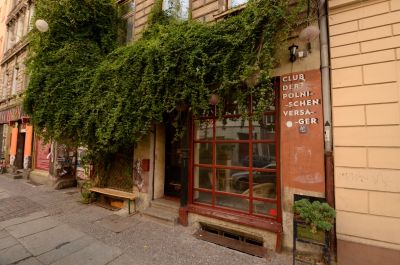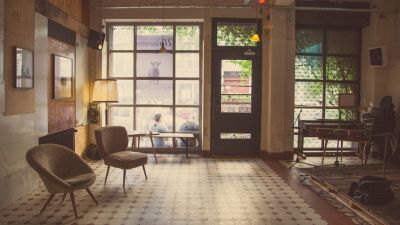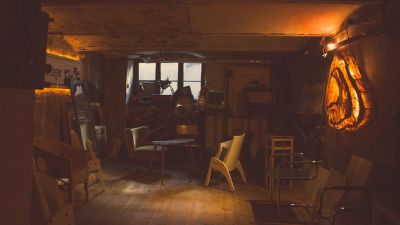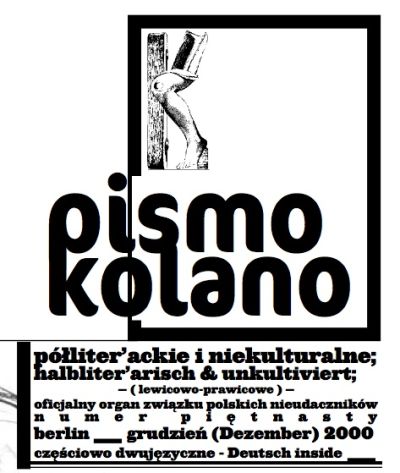The Polish Failures Club (Club der Polnischen Versager)

When the club opened its members could already look back on several years’ membership in the League of Polish Failures. 1994 saw the publication of the 0 edition of the journal “Kolano”, the mouthpiece of the league, and the “Mini-Manifesto of Polish Failures” - the birth certificate of the movement. The initial core of members consisted of Piotr Mordel and Leszek Oświęcimski, later joined by the likes of Wojciech Stamm, Joanna Bednarska, Tomasz Sosiński and Adam Gusowski. They had a lot in common. All of them arrived from Poland at the end of the 1980s with the intention of leading an active creative life abroad. The journal “Kolano” (Knee), the theatre group “Babcia Zosia” (Grandma Sophia), and the satirical radio programme “Gaulojzes Golana” are just a few examples of their activities and creativity. In addition these activities are also regularly presented at so-called “Polish Failures’ Festivals” in many places in Berlin and Germany. The largest festival of Polish failures took place in the Berlin suburb of Steglitz in the “Schwartz´schen Villa at the invitation of Doris Fürstenberg: it lasted three days.
In 2000 the loose members of the group decided to register the League of Polish Failures in the German register of organisations. Scarcely a year later they moved into new rooms of the Polish Failures Club in Torstrasse. This was now the official headquarters of the club. Even more! The club soon became a figurehead and meeting point for many people who wanted to involve themselves more with the idea of failure. The Polish Failures Club soon became a platform for a new unencumbered communication between Germans and Poles that found its expression in artistic actions and cultural events. Membership numbers rose rapidly. Many people first heard of the existence of the club in Alfred Biolek’s television talk-show “Boulevard Bio”, when the Polish Failures appeared alongside the most successful woman vocalist of the time, Britney Spears. In the first few years alone hundreds of Berliners possessed a “temporary membership card of the Polish Failures Club”. The Club rapidly came to the notice of the German and international press. In the first six months after it opened, over 60 articles appeared all over Germany about the club and its members. These were followed by radio and television features. At the start of the 21st century Polish life in Berlin was not very evident and no one reckoned with so much publicity. In 2007 the club had to move its premises because of gentrification in the area. It found a new home in “Schokoladen”, an alternative living and cultural project at 169 Ackerstraße in the centre of Berlin. Here the work of the club has continued unbroken.
Since the “Polish Failures Club” opened its rooms it has presented over 2000 cultural events from the areas of the pictorial arts, theatre, performance, literature, film and cabaret. But it’s not simply about art and culture. Its members also present lectures, discussions and talk shows in their efforts to become the mouthpiece of their generation in Germany. They listen and comment, take things in and move them out again. When Poland wanted to become part of the European Community in the process of the eastern expansion of the EU, club members published their own idiosyncratic comments on the situation. This resulted in a film entitled "The Baltic Sea Expansion” (original title “Die Ostseeerweiterung”: director Paweł Podlejski), in which Polish failures aimed to flood Poland in order to make it an underwater country with new perspectives. The plan was a failure.
Since 1998 there has been a radio programme entitled “Gaulojzes Golana” – broadcast by Radio multikulti / RBB and currently in Funkhaus Europa / wdr/rbb) – that comments satirically on German-Polish life. To celebrate its 10th anniversary the programme attracted over 1200 guests to its “Major Gala in the broadcasting house in Berlin.” For many years the club was a fixed part of the television programme “Kowalski meets Schmidt” (RBB) and equally responsible for the satirical part. Club members are also active on stage. “Leutnant Show” and “The Schizo-National” are two stage formats. Hence Polish Failures have never been tied to a particular place. Countless appearances in Germany and Austria can be attributed to the “Leutnant-Show”, which even once made it to Tokyo. From the very start openness has been a basic principle of club policies. The club is not only a home for Polish and German culture, but also for multinational culture in Berlin. Proof of this can be found in its intensive collaboration with the “Club Real” (exile Austrians) with “Eesty Film” (the Estonian community in Berlin), and “Ankoi” (the Japanese community).







